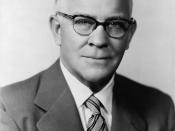Many authors take advantage of their outstanding writing abilities to convey their personal beliefs to the world. Arthur Miller is a prime example of a crafty playwright who divulges hidden messages through drama. Miller's inner psyche was molded by the miserable times of the Great Depression, which forced his family into bankruptcy, and proved the instability of modern existence to him. Though the setting occurs during the Salem witchcraft trials, Miller's play The Crucible, was actually directed towards the then prevalent congressional investigation of disruptive activities in the United States. There are many similarities between the personalities of the characters in The Crucible and the personality of Arthur Miller.
There was a period in time where the House Un-American Activities Committee, run by Senator Joseph R. McCarthy, was investigating and questioning individuals about their alleged Communist ideologies. Many of Miller's associates were compelled to give into to the persuasive pressures of the Committee.
Those who refused to cooperate with the vigorous interrogations found themselves excommunicated and their careers ruined. Miller himself was called before the committee, but he desisted from giving names of people he knew were involved in Communist movements. He was taken into custody for being unpatriotic, and his career languished for a long time thereafter. He wrote The Crucible as a response to his experience in the McCarthy hearings. John Proctor, the protagonist of The Crucible, is comparable to Arthur Miller because he, too, was put into the painful situation in which he had the opportunity to clear his name but did not because he risked framing others. Similar to Arthur Miller, Proctor remained loyal to his colleagues: "How may I teach [my children] to walk like men in the world, and I sold my friends?" (143). Miller is expressing through Proctor the importance...


